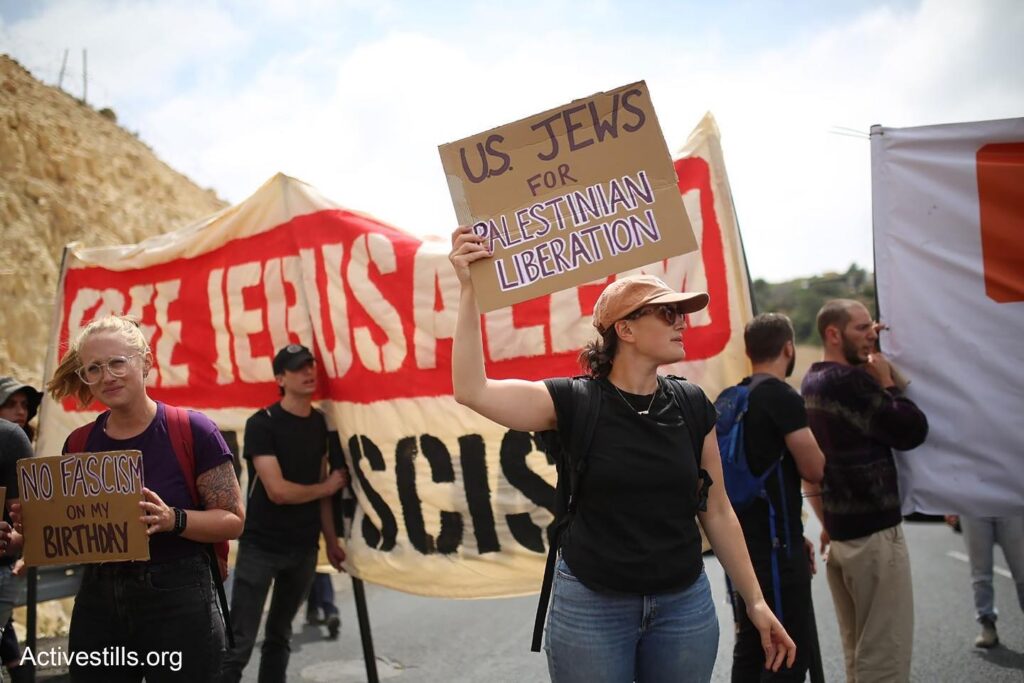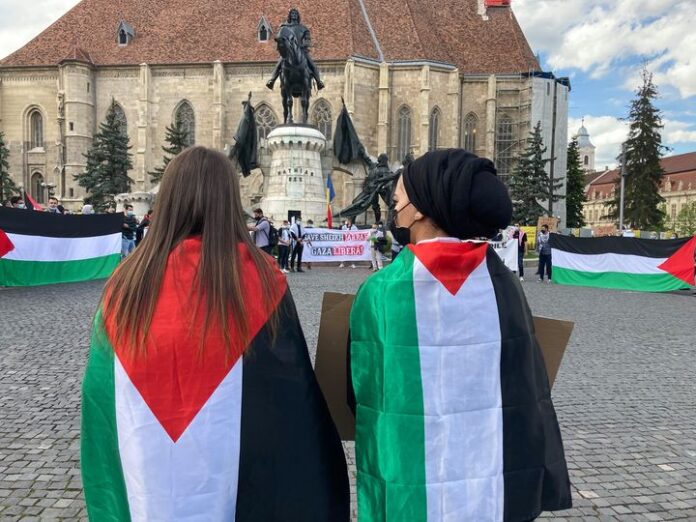Statement of the ISp affiliate in Romania, GAS – Socialist Action Group
In the previous days, the conflict between Palestinian forces and the regime in Israel reached new heights. Several militant groups in Gaza, led by Hamas, launched Operation Al-Aqsa Flood, taking the Israeli army and intelligence services by surprise. Palestinian militants tore down Israel’s fence that turned Gaza into the largest open-air prison, entered nearby Israeli colonial settlements and killed or captured both serving soldiers and civilians, killing hundreds. In the meantime, Hamas has fired a large number of rockets at military bases and civilian settlements alike.
The Popular Front for the Liberation of Palestine (PFLP), a Marxist-Leninist organisation, published an appeal encouraging Palestinians in the occupied territories (West Bank) to join the struggle against the occupation.
Israel retaliated with a complete blockade of the Gaza Strip, depriving both militants and civilians of water, electricity, food and medical treatment. The IDF bombed homes of Palestinian leaders as well as civilian housing blocks, ambulances, mosques and churches. Residential and commercial areas and refugee camps were particularly targeted. More than 700 people were killed and around 4,000 injured. The Defence Minister continues to threaten a major counter-offensive.
Various allegations point to the possible involvement of Iran’s theocratic regime in preparing the Palestinian retaliation. For their part, the Western imperialists and their subservient Ukrainian regime have announced their intentions to support Israel’s aggression. The European Commission has suspended financial support to Gaza.
The same political and media voices in the West, servile to the imperialist powers, which deplore the Russian invasion of Ukraine, are now lamenting the losses on the Israeli side, while conveniently forgetting to mention that such violence is a daily reality for the Palestinians. A grim near future looms for Gaza in the face of an adversary possessing weapons of mass destruction, such as white phosphorus, already in use. The Western media is, of course, silent in the face of these war crimes.
The Palestinians find themselves in the dangerous position of being abandoned by the other states in the region, which either want to avoid new tensions with Israel or exploit the situation according to their own geopolitical interests. One such example is Egypt, which assumes the role of mediator between Israel and Hamas, but at the same time plays its part in maintaining the blockade of Gaza by controlling the Rafah border crossing, the only part of the border not controlled by Israel.
Causes of the Conflict
This unprecedented escalation is the result of decades of systematic oppression of the Palestinian population by the Israeli regime.
The Palestinian territories in the West Bank remain under occupation and the government is building new settlements over the remaining land, while severely restricting the freedom of movement of the Arab population in these territories. Arabs in Israel and the occupied territories are subject to severe material and democratic deprivation and are denied basic rights, with Israel being considered an ‘apartheid state’ by several international observers and former members of the national government. Gaza, although unoccupied since 2005, has been under a severe and murderous blockade of the civilian population for years. At the same time, Palestinians who fight back against oppression are frequently killed or imprisoned by the repressive forces.
It is obvious that all this abuse and violence will mobilise the oppressed population to fight back and allow the political forces organising the fightback to cultivate a political base. Despite its obvious military superiority and support from Western imperialists, Israel will never be able to suppress this resistance once and for all.

Who Created Hamas?
Hamas (Islamic Resistance Movement, founded in 1988) is a reactionary political and paramilitary organization with a political-Islamist character and declared anti-communist stance. Hamas has controlled the Gaza Strip since 2007, where it operates its own government and has been in political conflict with the Fatah-dominated Palestinian Authority, which de jure administers the West Bank (in fact, much of its territory is under occupation). Hamas rejects the two-state solution and is a declarative supporter of full Palestinian liberation. Hamas tactics include rocket attacks, hostage-taking for negotiations and, in the past, suicide bombings.
Hamas gained a political base after the betrayal by the PLO (Palestine Liberation Organisation) leadership and the Palestinian national bourgeoisie, as the PLO secretly negotiated the first Oslo Accord in 1993 – followed by a second in 1995. The Oslo Accords enshrined Israel’s occupation of most of the West Bank, condemning its inhabitants to a life of terror, repression and colonialism.
The PLO’s capitulation, coupled with Israel’s violence, has allowed Hamas to run extensive social and charity programmes through which they have cultivated a political base. In 2006, Hamas democratically won the Palestinian legislative elections, which was followed by the takeover of the Gaza Strip and the hostilities with Fatah.
It should be noted that the responsibility for the emergence and rise to power of Hamas lies firstly with Israel, and secondly with the national bourgeoisie who – contrary to the expectations of the supporters of the stage theory – betrayed the very struggle for Palestinian national liberation. Hamas is, of course, an organisation that endangers the very population it claims to be fighting for, through its tactics that expose civilians on the front line or provoke retaliatory attacks from an adversary endowed with superior military technology. Had Israel not systematically oppressed the Palestinian population in the most violent ways, while denying them access to services essential to their livelihoods, Hamas would never have been able to cultivate a large enough base of supporters to seize power in Gaza.
But, in reality, the regime in Israel benefits in many ways from the existence of Hamas.
Everything to Lose for the People, Everything to Gain for the Leaders
In the current context, Israel experienced a mass mobilization of the popular classes in 2023 against judicial reforms and against the political and bureaucratic establishment. Up to 240,000 people mobilized in the streets of Tel Aviv in February-March, there were blockades, and the current government lost much of its popular support and resorted to various methods of repression against its own citizens.
Similarly, in Israel there are socialist, activist and workers’ groups who support an end to the occupation, the blockade and apartheid. Events such as the anti-fascist demonstration in May 2023, in which Israeli and international activists blocked the far-right Flag March from taking place, offer hope in this direction. However, the issue of Palestinian oppression is currently insufficiently addressed by the Israeli left, which is far too often reluctant to show solidarity. The split between them and Palestinian organisations is also a major problem.
The recent attacks by Hamas on Israeli civilians, resulting in some 900 deaths, not only make any solidarity between the working class of both nationalities more difficult, but also allow the Israeli government to legitimise itself in front of the population it claims to be defending from a dangerous enemy. A particularly serious effect is that this gives the Israeli regime the opportunity to bomb, kill and imprison Palestinians, while broadening its popular base in the process. Other Hamas attacks have been used by the government as a justification for intensive militarization and even biopolitical measures to control and limit mobility. All of these tools of repression ended up being used against their own people during the 2023 uprisings.
For its part, Hamas, as we have shown, has built its political base by attacking the Israeli enemy and providing services that the latter has denied. Palestinian resistance to the barbarism of the Israeli regime is justified and non-negotiable. At the same time, giving uncritical support to Hamas would be a political mistake for the left. A similar mistake was made by the international left in the case of Iran, and history has proved it: the new regime has not brought the liberation of the working class, of women, of the oppressed any closer, but, on the contrary, a new state form for the oppression and exploitation with which all of them are currently struggling. Liberation will not be achieved through cooperation with such forces.
Israel has also had another interest in the development of Hamas and other Islamist organisations: fighting secular national liberation groups grouped around the PLO – especially those following a communist line, such as the PFLP.
Both the current regime in Israel and organizations such as Hamas stand to gain from keeping the conflict exclusively on a national key, without a class dimension. Here, however, it should be noted that class unity is difficult as long as one side interacts with the other through the prism of the relationship between settler and the colonized, without any justice being served to the victims of colonization in any way – but also as long as the lives of civilians on both sides are endangered.
No Peace Without Justice
So what are the possible solutions?
The occupation of the West Bank must end and the blockade of Gaza must be lifted. Israel must withdraw all its settlements from Palestinian territory. Policies of repression and apartheid against the Arab population must end. Under any other conditions, temporary peace will only be achieved at the cost of long-term violence and oppression and the eruption of similar conflicts in the future.
The national problem in Palestine-Israel must be overcome through a class approach. Cooperation is needed between the working class in Palestine and Israel in order to articulate an alternative in the interests of the masses, against their own leaders who maintain this division. Because of the aforementioned colonial relations, it will probably be necessary for Israeli workers to take the first step by showing solidarity with the Palestinian struggle against the oppressive regime and supporting it through active methods.
Some recent initiatives by Israeli socialists and peace activists leave room for such a possibility, but a certain scepticism on the part of the Palestinian masses is an easy response to anticipate. Only through the unity of workers’ movements on both sides of the divide, arriving at commonly agreed proposals for resolving historical and current injustices, can a lasting peace be achieved. Although the current context seems against this direction, it is nevertheless a necessity.
Administrative solutions are difficult to anticipate at this stage. One of them may be a common, multi-ethnic, multicultural, multilingual state for the Arab and Israeli masses alike. Extending the model, we can also see the need for a socialist federation of Middle Eastern states, guaranteeing respect for self-determination while providing the political unity needed to prevent conflict.



